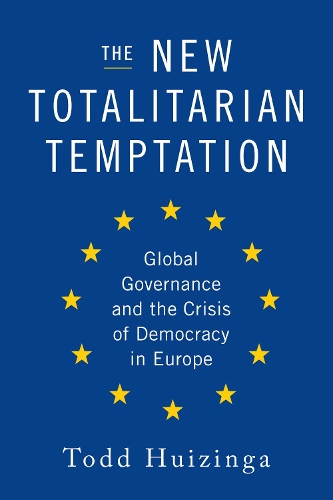
The New Totalitarian Temptation: Global Governance and the Crisis of Democracy in Europe
(Hardback)
Publishing Details
The New Totalitarian Temptation: Global Governance and the Crisis of Democracy in Europe
By (Author) Todd Huizinga
Encounter Books,USA
Encounter Books,USA
23rd February 2016
United States
Classifications
General
Non Fiction
Central / national / federal government policies
327.4
Physical Properties
Hardback
280
Width 152mm, Height 228mm
552g
Description
What caused the eurozone debacle and the chaos in Greece Why has Europes migrant crisis spun out of control, over the heads of national governments Why is Great Britain calling a vote on whether to leave the European Union Why are established political parties declining across the continent while protest parties rise All this is part of the whirlwind that EU elites are reaping from their efforts to create a unified Europe without meaningful accountability to average voters.
The New Totalitarian Temptation: Global Governance and the Crisis of Democracy in Europe is a must-read if you want to understand how the European Union got to this point and what the European project fundamentally is. This is the first book to identify the essence of the EU in a utopian vision of a supranationally governed world, an aspiration to achieve universal peace through a global legal order.
The ambitions of the global governancers are unlimited. They seek to transform not just the worlds political order, but the social order as welldiscarding basic truths about human nature and the social importance of tradition in favor of a human rights policy defined by radical autonomy and unfettered individual choice. And the global governance ideology at the heart of the EU is inherently antidemocratic. EU true believers are not swayed by the common sense of voters, nor by reality itself.
Because the global governancers aim to transfer core powers of all nations to supranational organizations, the EU is on a collision course with the United States. But the utopian ideas of global governance are taking root here too, even as the European project flames into rancor and turmoil. America and Europe are still cultural cousins; we stand or fall together. The EU can yet be reformed, and a commitment to democratic sovereignty can be renewed on both sides of the Atlantic.
Reviews
"The 'European project' is unraveling--not a moment too soon--because its soft authoritarianism is becoming too obvious to disguise or ignore. Todd Huizinga demonstrates how the European Union's multiplying misadventures are reminding us of what EU elites want us to forget: the indissoluble link between rights-based self-government and the nation-state, which is not an anachronism after all." --George F. Will "If the European Union prefigures one possible future of the global order, as Todd Huizinga argues, globally concerned citizens cannot afford to ignore the questions he raises in this book. Wise in tone and even prophetic, it is seasoned with personal experience and shows a solid grasp of practical policies as well as ideas. This is essential reading for all who care about the course on which humanity is sailing." --Os Guinness, author of The Global Public Square "This is the best book ever written about the European Union. Having spent years in Brussels as an American diplomat, Huizinga knows European politics and culture as few statesmen or scholars do. He deftly dissects the powerful vision of global governance behind the endless directives from the EU bureaucracy. This lucidly argued text is indispensable to understanding Europe's current crises--of democracy and sovereignty, immigration and national identity--as well as America's relationship with Europe." --John Fonte, director of the Center for American Common Culture at the Hudson Institute, author of Sovereignty or Submission: Will Americans Rule Themselves or Be Ruled by Others "This brilliant book is the single best volume on the European Union from a conservative viewpoint that I have read. The insights sparkle on every page. What makes it so compelling is that Huizinga understands both the American society and the European project from personal and professional experience. He offers a lucid perspective on the friction between Europe's relativistic postmodernism and the strong fiber of Christian conviction that runs through American culture and democracy." --David Aikman, award-winning journalist, author of The Mirage of Peace: Understanding the Never-Ending Conflict in the Middle East
Author Bio
Todd Huizinga is director of International Outreach at the Acton Institute for the Study of Religion and Liberty in Grand Rapids, Michigan. He is a cofounder of the Transatlantic Christian Council and a research fellow of Calvin College's Paul B. Henry Institute for the Study of Christianity and Politics. As a U.S. diplomat from 1992 until 2012, Mr. Huizinga served as deputy chief of mission at the U.S. embassy in Luxembourg, political counselor at the U.S. mission to the European Union in Brussels, consul for political and economic affairs at the U.S. consulates in Hamburg and Munich, and consul for public affairs at the U.S. consulate in Monterrey, Mexico. He has also served in Dublin, Frankfurt, and Costa Rica, as well as on the European Union Desk at the State Department in Washington, D.C. He speaks German, Dutch, Spanish, and French.
